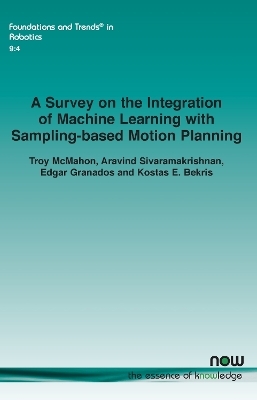
A Survey on the Integration of Machine Learning with Sampling-based Motion Planning
Seiten
2022
now publishers Inc (Verlag)
978-1-63828-134-4 (ISBN)
now publishers Inc (Verlag)
978-1-63828-134-4 (ISBN)
Focuses specifically on integrating machine learning tools to improve the efficiency, convergence, and applicability of SBMPs. The publication covers a wide range of robotic applications, including, but not limited to, manipulation planning, and planning for systems with dynamic constraints.
Motion planning is the problem of finding valid paths, expressed as sequences of configurations, or trajectories, expressed as sequences of controls, which move a robot from a given start state to a desired goal state while avoiding obstacles. Sampling-based methods are widely adopted solutions for robot motion planning. The methods are straightforward to implement, and effective in practice for many robotic systems. Furthermore, they have numerous desirable properties, such as probabilistic completeness and asymptotic optimality. Nevertheless, sampling-based methods still face challenges as the complexity of the underlying planning problem increases, especially under tight computation time constraints, which impact the quality of returned solutions or given inaccurate models. This has motivated machine learning to improve the computational efficiency and applicability of Sampling-Based Motion Planners (SBMPs).There are numerous publications on the use of machine learning algorithms to improve the efficiency of robotic systems in general. Recently, attention has focussed on the progress of deep learning methods, which has resulted in many efforts to utilize the corresponding tools in robotics. This monograph focuses specifically on integrating machine learning tools to improve the efficiency, convergence, and applicability of SBMPs. The publication covers a wide range of robotic applications, including, but not limited to, manipulation planning, and planning for systems with dynamic constraints. In particular, this manuscript first reviews the attempts to use machine learning to improve the performance of individual primitives used by SBMPs. It also studies a series of planners that use machine learning to adaptively select from a set of motion planning primitives. The monograph then proceeds to study a series of integrated architectures that learn an end-to-end mapping of sensor inputs to robot trajectories or controls. Finally, the monograph shows how SBMPs can operate over learned models of robotic system due to the presence of noise and uncertainty, and it concludes with a comparative discussion of the different approaches covered in terms of their impact on computational efficiency of the planner, quality of the computed paths as well as the usability of SBMPs. Also outlined are the broad difficulties and limitations of these methods, as well as potential directions of future work.
Motion planning is the problem of finding valid paths, expressed as sequences of configurations, or trajectories, expressed as sequences of controls, which move a robot from a given start state to a desired goal state while avoiding obstacles. Sampling-based methods are widely adopted solutions for robot motion planning. The methods are straightforward to implement, and effective in practice for many robotic systems. Furthermore, they have numerous desirable properties, such as probabilistic completeness and asymptotic optimality. Nevertheless, sampling-based methods still face challenges as the complexity of the underlying planning problem increases, especially under tight computation time constraints, which impact the quality of returned solutions or given inaccurate models. This has motivated machine learning to improve the computational efficiency and applicability of Sampling-Based Motion Planners (SBMPs).There are numerous publications on the use of machine learning algorithms to improve the efficiency of robotic systems in general. Recently, attention has focussed on the progress of deep learning methods, which has resulted in many efforts to utilize the corresponding tools in robotics. This monograph focuses specifically on integrating machine learning tools to improve the efficiency, convergence, and applicability of SBMPs. The publication covers a wide range of robotic applications, including, but not limited to, manipulation planning, and planning for systems with dynamic constraints. In particular, this manuscript first reviews the attempts to use machine learning to improve the performance of individual primitives used by SBMPs. It also studies a series of planners that use machine learning to adaptively select from a set of motion planning primitives. The monograph then proceeds to study a series of integrated architectures that learn an end-to-end mapping of sensor inputs to robot trajectories or controls. Finally, the monograph shows how SBMPs can operate over learned models of robotic system due to the presence of noise and uncertainty, and it concludes with a comparative discussion of the different approaches covered in terms of their impact on computational efficiency of the planner, quality of the computed paths as well as the usability of SBMPs. Also outlined are the broad difficulties and limitations of these methods, as well as potential directions of future work.
1. Introduction
2. Sampling-based Motion Planning
3. Learning Primitives of Sampling-based Motion Planning
4. Learning-based Pipelines
5. SBMP with Learned Models
6. Discussion
References
| Erscheinungsdatum | 14.11.2022 |
|---|---|
| Reihe/Serie | Foundations and Trends® in Robotics |
| Verlagsort | Hanover |
| Sprache | englisch |
| Maße | 156 x 234 mm |
| Gewicht | 118 g |
| Themenwelt | Informatik ► Theorie / Studium ► Künstliche Intelligenz / Robotik |
| ISBN-10 | 1-63828-134-3 / 1638281343 |
| ISBN-13 | 978-1-63828-134-4 / 9781638281344 |
| Zustand | Neuware |
| Haben Sie eine Frage zum Produkt? |
Mehr entdecken
aus dem Bereich
aus dem Bereich
was sie kann & was uns erwartet
Buch | Softcover (2023)
C.H.Beck (Verlag)
18,00 €
von absurd bis tödlich: Die Tücken der künstlichen Intelligenz
Buch | Softcover (2023)
Heyne (Verlag)
20,00 €
dem Menschen überlegen – wie KI uns rettet und bedroht
Buch | Hardcover (2023)
Droemer (Verlag)
24,00 €


